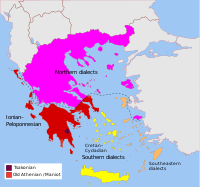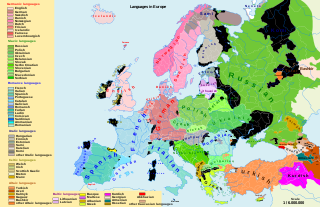
There are over 250 languages indigenous to Europe, and most belong to the Indo-European language family. Out of a total European population of 744 million as of 2018, some 94% are native speakers of an Indo-European language. The three largest phyla of the Indo-European language family in Europe are Romance, Germanic, and Slavic; they have more than 200 million speakers each, and together account for close to 90% of Europeans.

Greek is an independent branch of the Indo-European family of languages, native to Greece, Cyprus, Italy, southern Albania, and other regions of the Balkans, the Black Sea coast, Asia Minor, and the Eastern Mediterranean. It has the longest documented history of any Indo-European language, spanning at least 3,400 years of written records. Its writing system is the Greek alphabet, which has been used for approximately 2,800 years; previously, Greek was recorded in writing systems such as Linear B and the Cypriot syllabary. The alphabet arose from the Phoenician script and was in turn the basis of the Latin, Cyrillic, Coptic, Gothic, and many other writing systems.
Arvanitika, also known as Arvanitic, is the variety of Albanian traditionally spoken by the Arvanites, a population group in Greece. Arvanitika was brought to southern Greece during the late Middle Ages by Albanian settlers who moved south from their homeland in present-day Albania in several waves. The dialect preserves elements of medieval Albanian, while also being significantly influenced by the Greek language. Arvanitika is today endangered, as its speakers have been shifting to the use of Greek and most younger members of the community no longer speak it.
Modern Greek, generally referred to by speakers simply as Greek, refers collectively to the dialects of the Greek language spoken in the modern era, including the official standardized form of the language sometimes referred to as Standard Modern Greek. The end of the Medieval Greek period and the beginning of Modern Greek is often symbolically assigned to the fall of the Byzantine Empire in 1453, even though that date marks no clear linguistic boundary and many characteristic features of the modern language arose centuries earlier, having begun around the fourth century AD.
This is a list of languages spoken in regions ruled by Balkan countries. With the exception of several Turkic languages, all of them belong to the Indo-European family. A subset of these languages is notable for forming a well-studied sprachbund, a group of languages that have developed some striking structural similarities over time.
Pontic Greek is an endangered variety of Modern Greek indigenous to the Pontus region on the southern shores of the Black Sea, northeastern Anatolia, and the Eastern Turkish/Caucasus region. Today it is spoken mainly in northern Greece. Its speakers are referred to as Pontic Greeks or Pontian Greeks. It is not completely mutually intelligible with modern Demotic Greek.
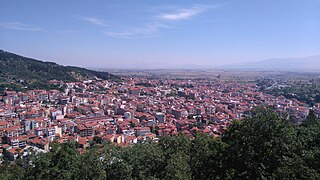
Florina is a town and municipality in the mountainous northwestern Macedonia, Greece. Its motto is, 'Where Greece begins'.

The Greek diaspora, also known as Omogenia, are the communities of Greeks living outside of Greece and Cyprus.

Macedonia is a geographic and former administrative region of Greece, in the southern Balkans. Macedonia is the largest and second-most-populous geographic region in Greece, with a population of 2.36 million. It is highly mountainous, with major urban centres such as Thessaloniki and Kavala being concentrated on its southern coastline. Together with Thrace, along with Thessaly and Epirus occasionally, it is part of Northern Greece. Greek Macedonia encompasses entirely the southern part of the wider region of Macedonia, making up 51% of the total area of that region. Additionally, it widely constitutes Greece's borders with three countries: Albania to the northwest, North Macedonia to the north, and Bulgaria to the northeast.
Minorities in Greece are small in size compared to Balkan regional standards, and the country is largely ethnically homogeneous. This is mainly due to the population exchanges between Greece and neighboring Turkey and Bulgaria, which removed most Muslims and those Christian Slavs who did not identify as Greeks from Greek territory. The treaty also provided for the resettlement of ethnic Greeks from those countries, later to be followed by refugees. There is no official information for the size of the ethnic, linguistic and religious minorities because asking the population questions pertaining to the topic have been abolished since 1951.
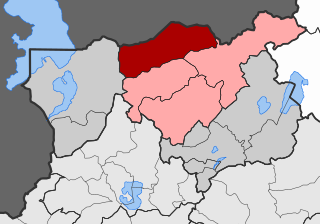
Kato Kleines is a village and a former municipality in Florina regional unit, West Macedonia, Greece. Since the 2011 local government reform it is part of the municipality Florina, of which it is a municipal unit. The municipal unit has an area of 188.564 km2. It is 7 km north of the city of Florina. The population was 2,132 in 2021.

Lechovo, renamed as Iroiko between 1955 and 1956, is a village and a former community in Florina regional unit, Western Macedonia, Greece. Since the 2011 local government reform it is part of the municipality Amyntaio, of which it is a municipal unit. The municipal unit has an area of 22.844 km2, and a population of 782. The village is set amongst the mountains of Northern Greece and the main road runs through the town's centre. There is a museum, a football pitch and an indoor handball stadium. Lechovo has stone architecture common to many northern villages, and has an old upper square and church bell tower.
The linguistic varieties of Modern Greek can be classified along two principal dimensions. First, there is a long tradition of sociolectal variation between the natural, popular spoken language on the one hand and archaizing, learned written forms on the other. Second, there is regional variation between dialects. The competition between the popular and the learned registers culminated in the struggle between Dimotiki and Katharevousa during the 19th and 20th centuries. As for regional dialects, variation within the bulk of dialects of present-day Greece is not particularly strong, except for a number of outlying, highly divergent dialects spoken by isolated communities.
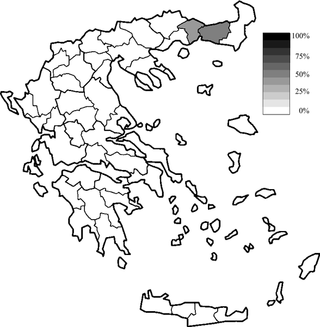
The Muslim minority of Greece is the only explicitly recognized minority in Greece. It numbered 97,605 according to the 1991 census, and unofficial estimates ranged up to 140,000 people or 1.24% of the total population, according to the United States Department of State.
The Urums are several groups of Turkic-speaking Greek Orthodox people native to Crimea. The emergence and development of the Urum identity took place from 13th to the 17th centuries. Bringing together the Crimean Greeks along with Greek-speaking Crimean Goths, with other indigenous groups that had long inhabited the region, resulting in a gradual transformation of their collective identity.
The Vallahades or Valaades were a Muslim Macedonian Greek population who lived along the river Haliacmon in southwest Greek Macedonia, in and around Anaselitsa and Grevena. They numbered about 17,000 in the early 20th century. They are a frequently referred-to community of late-Ottoman Empire converts to Islam, because, like the Cretan Muslims, and unlike most other communities of Greek Muslims, the Vallahades retained many aspects of their Greek culture and continued to speak Greek for both private and public purposes. Most other Greek converts to Islam from Macedonia, Thrace, and Epirus generally adopted the Ottoman Turkish language and culture and thereby assimilated into mainstream Ottoman society.
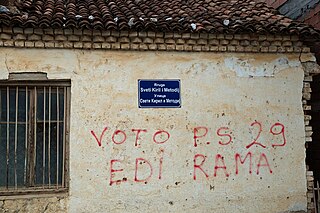
Albania is an ethnically homogeneous country, where the overwhelming majority of the population speaks Albanian, which is also the official language. It has two distinct dialects: Tosk, spoken in the south, and Gheg, spoken in the north. However, many Albanians can also speak foreign languages as Italian, Greek, French, German, and English, amongst others, due to the high numbers of Albanian diaspora and Albanian communities throughout the Balkans.

The official language of North Macedonia is Macedonian, while Albanian has co-official status. Macedonian is spoken by roughly two-thirds of the population natively, and as a second language by much of the rest of the population. Albanian is the largest minority language. There are a further five national minority languages: Turkish, Romani, Serbian, Bosnian, and Aromanian. The Macedonian Sign Language is the country's official sign language.
The Greeks in the Czech Republic have a presence dating back to the 20th century. Roughly 12,000 Greek citizens, mainly from Greek Macedonia in Northern Greece, who fled from the 1946–1949 Greek Civil War were settled in several formerly German inhabited areas in Czechoslovakia.
The various regional and minority languages in Europe encompass four categories:


